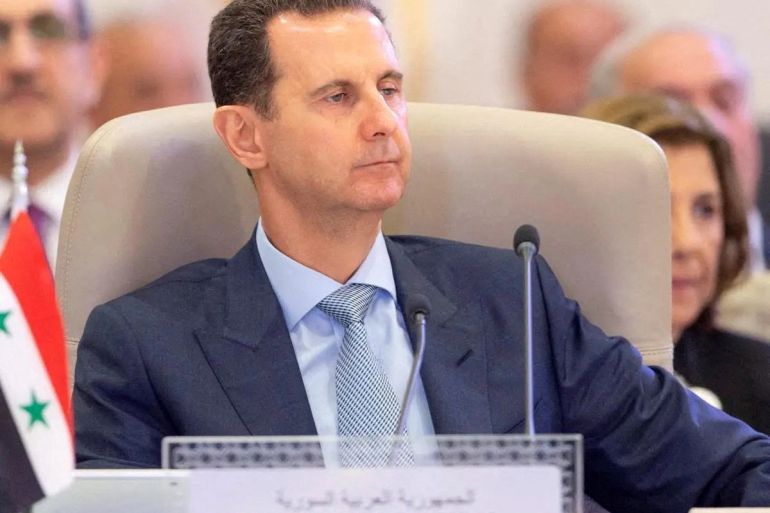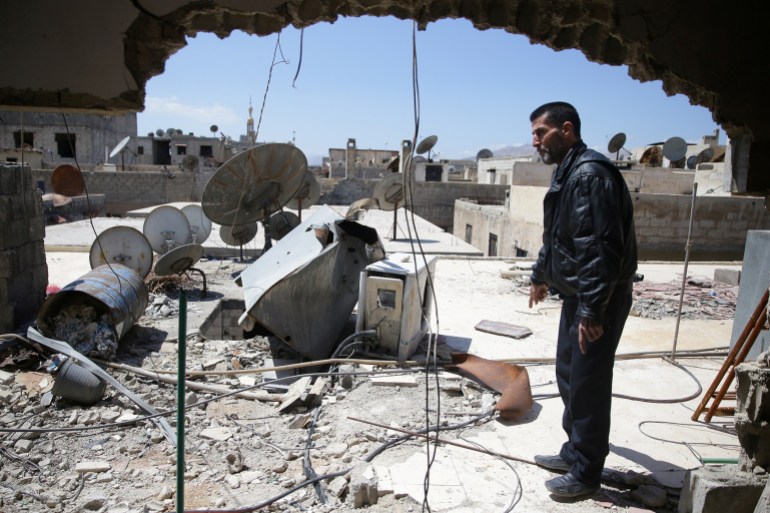France issues arrest warrant for Syria’s al-Assad
The warrant charges Syria’s president with complicity in ‘crimes against humanity and complicity in war crimes’.

France has issued international arrest warrants for Syria’s president, his brother and two other senior officials over the use of banned chemical weapons against civilians in Syria, according to a judicial source and lawyers representing victims.
The arrest warrants charge Syria’s President Bashar al-Assad, his brother Maher, military generals Ghassan Abbas and Bassam al-Hassan with complicity in crimes against humanity and complicity in war crimes, according to a judicial source quoted by the Reuters news agency on Wednesday and lawyers representing Syrian victims.
Keep reading
list of 4 itemsPhotos: Assad’s ruling party office shut by protests in Sweida, Syria
Has Bashar al-Assad really won the war in Syria?
Russia, al-Assad step up Syria bombing amid world focus on Israel-Gaza war
Maher al-Assad heads an elite Syrian military unit, the 4th Armoured Division, while the two military generals, Ghassan Abbas and Bassam al-Hassan, work with a Syrian research agency accused of developing chemical weapons, according to the rights group Civil Rights Defenders.
The warrants follow a criminal investigation into chemical attacks in the town of Douma and the district of Eastern Ghouta in August 2013, which killed more than 1,000 people.
It is the first international arrest warrant that has been issued for the Syrian head of state, whose forces responded to protests that began in 2011 with a brutal crackdown that UN experts have said amounts to war crimes.
These are also the first international arrest warrants that have been issued over the chemical weapons attack in Ghouta, said Mazen Darwish, lawyer and founder of the Syrian Center for Media and Freedom of Expression (SCM), which filed the case in France.
France claims worldwide jurisdiction for alleged war crimes and crimes against humanity.
Syria denies using chemical weapons but a previous joint inquiry of the United Nations and the Organisation for the Prohibition of Chemical Weapons found that the Syrian government used the nerve agent sarin in an April 2017 attack and has repeatedly used chlorine as a weapon.
There was no immediate comment from Damascus.
Step towards justice
Darwish said the decision was “a victory for the victims, their families, and the survivors” of the 2013 chemical attack, and a step towards “justice and sustainable peace in Syria”.
“It’s a huge development…An independent jurisdiction is recognising that the chemical attack couldn’t have happened without the knowledge of the Syrian president, that he has responsibility and should be held accountable,” Darwish said.
The case against al-Assad and the high-ranking military officials was bolstered by first-hand witness accounts and deep analysis of the Syrian military chain of command, Darwish said.
Activists in 2013 posted amateur videos on YouTube said to show the effects of the attack, including footage of dozens of corpses, many of them children, stretched out on the ground.
Other images showed unconscious children, people foaming at the mouth and doctors apparently giving them oxygen to help them breathe.
The scenes provoked revulsion and outcry around the globe.
A UN report later said there was clear evidence of the use of sarin gas, a deadly nerve agent.

Syria agreed in 2013 to join the Organisation for the Prohibition of Chemical Weapons (OPCW) global watchdog and give up all chemical weapons.
The OPCW has since blamed Damascus for a series of chemical attacks during the civil war.
The Syrian government has denied the allegations.
Syria’s civil war broke out in 2011 after al-Assad’s repression of peaceful demonstrations escalated into a deadly conflict that pulled in foreign powers.
The war has killed more than half a million people and displaced half of the country’s pre-war population.